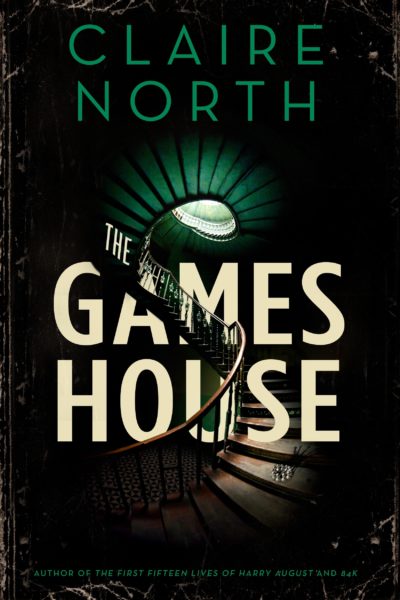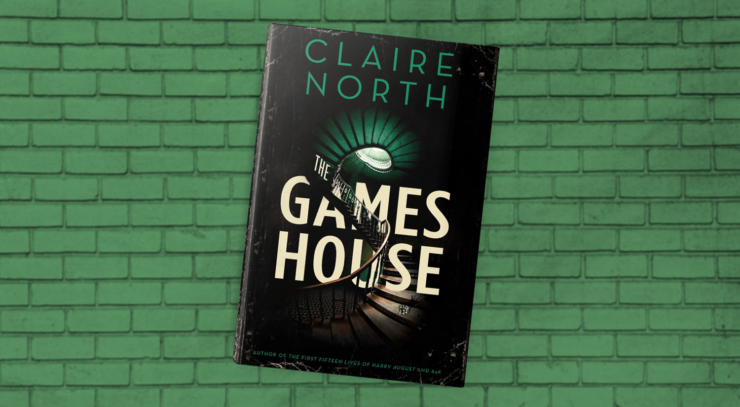Claire North’s The Gameshouse was first published in 2015, as a series of three, interconnected, digital-only novellas. In 2019, at long last, the three are collected into a single volume, and in a format where it can sit snugly on the shelf alongside North’s other works.
In case the laudatory flavour of that introduction is in any way misleading, let me be clear: I wholly believe The Gameshouse is one of the ‘single’ best works of modern fantasy. Nor, thanks to its unusual path to publication, is this recency bias. I’ve had four years to read and re-read The Gameshouse, and it gets better every time.
If North has a ‘shtick’, it is our world—our real, wonderful, edgy and oft-baffling world—with a hidden twist. The introduction, for example, of a single, fantastical power—such as invisibility (The Sudden Appearance of Hope) or a limited type of time travel (The First Fifteen Lives of Harry August). In the best tradition of Golden Age SF, North then explores what that twist does—what its impact can be, what sort of society would time-recursive immortals create? What are the physical limitations of body-hopping? What are the unique problems that these powers can create? In the best tradition of post-Golden Age SF, North then gently eschews all of that to focus on the human element. What do these powers, and institutions, and societies actually mean? What does it do to a human to be part of, but removed from, the rest of the world? What’s the emotional and moral cost, not just the cost paid by our unique protagonists, but by the rest of the world?
The Gameshouse continues this pattern. The titular Gameshouse itself is the twist: an institution that exists outside of conventional geography; a private club where any game of chance can be played. The doors open in every city in the world (and then some), and fortunes can be won or lost in an evening. But for the best players, there’s even more at stake. The Gameshouse hosts a ‘higher league’ a semi-mythic level of play, where the most talented, brilliant gamesters can wager the impossible: memories, ailments, even years of their life. Here, the games aren’t played on boards, but with people. Risk, Diplomacy, chess: all played with real countries, real armies, and real lives. All for the sake of the game.
Buy the Book


The Gameshouse
The first story, “The Serpent”, takes place in 17th century Venice. Thene is a young woman married to a man that—we rapidly learn—is not worthy of her. He’s a petty failure; she’s a brilliant light, contained only by the era in which she lives. Thene follows her exasperating husband into the Gameshouse one night, where it is her—not him—who is invited into the higher league. Although a talented player in her own right, the league offers much more than games: it can be her chance at freedom. The game is a fairly straightforward one: Thene and the other aspirants compete to put their candidate into an important political position. But the game is deadly, and possibly even rigged…
The second story, “The Thief”, takes place in 1930. Remy is an experienced player in the higher league, but in a moment of (very drunken) weakness, he commits to a game at terrible odds. He’s now caught playing ‘Hide and Seek’ in Thailand: trying his very best to stay ahead of his captors. At stake? All of his memories. Remy is a charming, if desperate, fugitive, and North brings rural Thailand to life with the same poetic skill that she does urban Venice. Remy, like Thene, is a likeable underdog, in a game where the odds are are weighted against him.
The final story, “The Master” completes the sequence set up by the first two. It features a player, Silver, who has cameo appearances in the previous stories. Whereas Thene competed for freedom and Remy for survival, “The Master” puts the Gameshouse itself at stake, and with it, the world. It teases elements of the Gameshouse history and mythos, but never succumbs to infodumping. The magic itself is not important: the cost of it is.
Without spoiling The Gameshouse, there’s a lot to love in here. There’s a pure hedonistic joy to the games themselves: books about games can be immensely fun (see also: The Player of Games). Simply on that level, this is a hoot—North captures all the drama and tension of great sport. The Gameshouse has three very different characters, but they’re all united by being deliciously clever. This is a book (or micro-series) that’s not about destiny or magic swords or even, despite the mechanics, ‘levelling up’. It is about hard work, patience, and a lot of scheming. North’s writing up to the task as well – alternating between gloriously immersive prose and a snappy sense of humour, using the change of pace to highlight and defuse tension as needed.
Perhaps most impressively, The Gameshouse is about more than games. In fact, the theme is just that: games themselves can never be everything. Humanity itself needs to play a part. The players in the Gameshouse are divided into two camps: those that succumb to the game, and play without recognising its cost, and those who care about its impact on both players and pawns alike. Without being cliché, it’s about how you play the game. And this book is, above all, a winner.
The Gameshouse is available from Orbit.
Jared Shurin is the editor of The Djinn Falls in Love, The Outcast Hours, The Best of British Fantasy, and many other published and/or forthcoming works. He writes irregularly at raptorvelocity.com and continuously at @straycarnivore.










